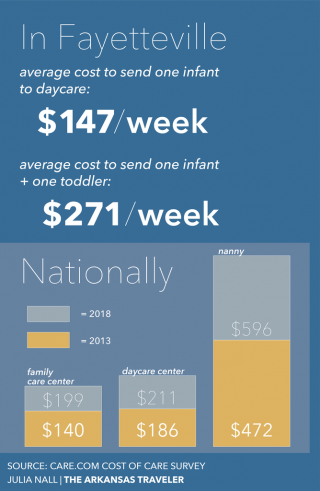Oct. 24, 2019
By Chase Reavis

Sophie Sims (left), 3, and Jeanie Sims (right), 3, slide down the dog ramp outside of their aunt and uncle’s house Oct. 13. Both of Stephanie’s uncles and her father own land in West Fork — a 12-acre joined plot of land that John “Pa John” Harrison, 77, bought about fifty years ago and gave to his family who have since dotted the land with four houses, a few sheds and garages, several children and a host of dogs. Photo by Chase Reavis
A week-long vacation to Beaver Lake Hide-A-Way Campground in October gave 32-year-old Stephanie Sims a much-needed break, not only from work but also from daycare costs for her 3-year-old twin girls, Jeanie and Sophie. The trailer they stayed in was small with all three of them, but the escape to nature was exactly what they needed.
The quality time was nice for Mom and the girls, but the guys had to stay home, with David Sims, 33, working full-time as a resource special-education teacher at Siloam Springs Intermediate School and their oldest, Colby Sims, 7, still in school.
But the problems of the Sims family go beyond not having enough quality time. Since having Colby in 2012, the Sims have struggled with juggling daycare costs, school fees and their teaching careers. This year, the Sims are paying the most they’ve ever paid for daycare: $275 a week.
“At the beginning of this school year, (David was) like, ‘Would it not just be cheaper for me to stay home? My entire check goes straight to daycare,’” Stephanie said.
In the 2019 Northwest Arkansas Quality of Life survey, just under half of surveyed NWA residents considered daycare in the region high quality and only 22% considering it affordable.
Stephanie works as a resource special-education teacher during her mornings at Owl Creek School and her afternoons at Asbell Elementary School — both in Fayetteville, Arkansas. David leaves for work every day by 6:40 a.m. and does not make it home most days until 4:30 p.m.
“I have lots of conversations with my students, and it’s like, ‘I get to see you guys more than I see my own children,’ so I mean that is hard,” Stephanie said.
On a national level, for the past two years, 70% of families indicated paying more than 10% of their income on care, according to Care.com’s Cost of Care survey.
When David was offered his position in Siloam Springs, which leaves him with some leftover earnings after daycare costs, they decided to keep their twins in daycare at Tumbles Day Care Center in West Fork, Arkansas, where they reside. The Sims sent Colby to Tumbles and continue to send him for before- and after-school care.
“I think the biggest thing about having kids in daycare is the financial hurt and the lack of time with your children,” Stephanie said.

Nationally, weekly rates for daycare have risen, yet the average cost to send one infant to daycare is about 30% cheaper in Fayetteville.
The national average weekly cost for the care of one infant child is $199 for a family care center and $211 for a day care center, according to Care.com. Each of these options has increased since 2013, from $140 and $186, respectively.
Stephanie does not use the full 10-hour window allotted daily for parents at Tumbles, desperate to spend as much time as possible with her kids, who are usually at daycare from 7 a.m. until 3:45 p.m. every weekday.
“I only get like four hours a day with them, so I want to get them as soon as I can,” Stephanie said.

Jeanie Sims (left), 3, Colby Sims (center), 7, and Sophie Sims (right), 3, show off their handwriting skills Oct. 13. Relatives pass by, offering words of encouragement or some grapes before heading out to the patio to relax. Photo by Chase Reavis
The Sims chose to send Colby to Tumbles after researching other centers in the region and finding that Tumbles was the most affordable and accessible for them. Stephanie considers the staff to be devoted to the care of her children.
Before sending her children to Tumbles, Stephanie saw how much they cared about her nephew, who even now at 18 years old, the Tumbles staff calls their kid, she said.
“We ended up buying a house in West Fork to be closest to Tumbles to keep the kids there,” Stephanie said. “They actually don’t even call it Tumbles; they call it Ms. Megan’s because that was their toddler teacher when they first really started to learn to talk and stuff.”
Ms. Megan, Megan Wootton, is now the assistant director of Tumbles — where “we love each other like a big family,” she said in an email.
The center’s rates are determined by looking at the center’s main expenses: food and payroll costs, Wootton said.
Without the support of her and her husband’s families, Stephanie said they would not have been able to swing the costs.
“I mean, just feeding them costs money, so it’s just daycare on top of those normal expenses just makes it even more,” Stephanie said. “We knew that going into having children, but we weren’t expecting twins, so that kind of threw us for a loop.”
When she found out she was having twins due November 2015, Stephanie said it was “the scariest thing,” and that her “husband didn’t talk for like six hours.”
When David found out they were having twins, he knew “immediately that that was going to really put a financial burden” on the family, he said.
“There’s no way we could’ve paid for the twins five days a week,” Stephanie said.
Michelle Wynn, co-director of Child Care Aware of NWA, spends her days on the phone with parents, many of whom are struggling to find the money for daycare and don’t qualify for any financial support.
Child Care Aware of NWA is a non-profit organization that offers a referral service for parents looking for affordable child care, fielding an average of five calls a day during which representatives help parents find their options in the region.
For families like the Sims, who have teetered on the poverty line but haven’t steadily qualified for governmental assistance, Wynn said “it’s the hardest conversation to have,” because “there’s not anything.”
“It’s very hard. I mean, there are days that you feel like, I’ve tried to do my job the best I can, but you sit there and you’re like, ‘I’m trying to come up with all these different resources, but I’ll be honest with you, there’s nothing else out there,’” Wynn said.
But the Sims found luck when David’s mother retired and offered to make the hour-and-a-half drive from Howe, Oklahoma, twice a week to watch the girls. Despite facing health problems, David’s mother wanted to help, Stephanie said.
Stephanie and David’s families have continued to be a huge part of the children’s lives. At their aunt and uncle’s house in West Fork, Jeanie, Colby, and Sophie sit at the table, practicing their handwriting skills. Relatives pass by the children, offering words of encouragement or some grapes before heading out to the patio to relax. Jeanie and Sophie have just nailed the first letters of their names, and Colby was quick to jot his down before heading outside to practice disc golf.
“I really don’t know how people without families do it because if it wasn’t for my family, we would not function,” Stephanie said. “There’s been times where my parents and grandparents have shown up at my house with bags of groceries, and if it wasn’t for them, we wouldn’t have been able to afford it. They’re my world, everyone from aunts and uncles to grandparents.”
Debbie Malone, program coordinator for Child Care Aware of NWA, said many parents in NWA she hears from don’t have family in the area to support them because many of them moved to the region for work or school.
Even with 350 providers across Washington and Benton counties, Wynn and Malone still urge parents to start looking for child care as soon as possible.
“With this area growing so fast, it sounds funny to say but really, once you’re pregnant you need to be looking for child care,” Wynn said.
By fall 2021, Stephanie expects her girls to be enrolled in kindergarten, but she does not expect to quit paying daycare costs for another six years. Until Colby is 13, Stephanie plans to keep the twins in before- and after-school care, like Colby is now.
Since David’s father also retired, his mother has quit watching the twins two days a week, who now go full-time to the daycare.
Beyond daycare costs, babysitter costs keep Stephanie and David from being able to spend much time together, she said.
“Since having the twins, we haven’t gone out and done stuff, because we can’t afford to pay someone double to watch the twins, so if my nieces aren’t available to watch the twins, we don’t do anything,” Stephanie said. “We can’t afford a sitter on top of daycare costs.”
Stephanie spends all day working with children before going home to children of her own — something she says some find impressive and others find impossible, especially with twins. But since she was 16 years old and taught her 5-year-old cousin to spell “cheese,” she has known that teaching and raising children is what she’s meant to do, she said.

Jeanie Sims crawls through her aunt and uncle’s dog door on Oct. 13, pretending to be a cheetah with her sister.
Although it’s hard not seeing her children much throughout the day, Stephanie feels blessed to have such a great support network in her family and at Tumbles.
“It makes it so much easier because I know they’re going to treat my kids like their own kids,” Stephanie said. “They are still staying with family even though we’re not technically related.”